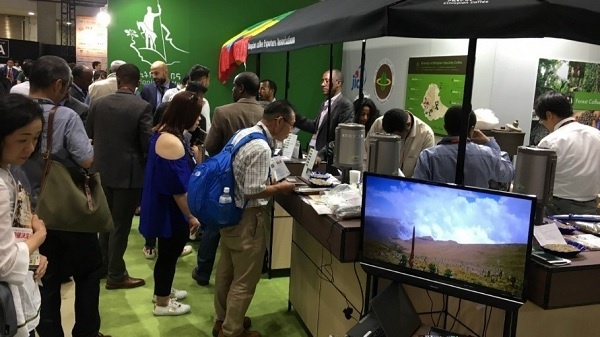
A national coffee brand, dubbed Ethiopian Coffee, has been developed by the Ethiopian government through consultations with Japan International Cooperation Agency (JICA)
TOJYO (JICA) – SCAJ World Specialty Coffee Conference and Exhibition 2019 was held in Tokyo, Japan from 11 to 13 September 2019. It is the largest event dedicated to specialty coffee in Asia. At this year’s event, specialty coffee-related companies and organizations from 25 countries and regions came together and exhibited at more than 300 booths. The Ethiopian Coffee Exporters Association (ECEA) exhibited a booth, with design and construction support from JICA’s “Ethiopia Industrial Promotion Project (Export Promotion)” project.
Ethiopia is the origin of Arabica Coffee and the country is home to more than 6,000 varieties of coffee. As one of the highlights of this year’s exhibition, Ethiopian coffee exporters demonstrated their carefully selected specialty coffee and offered tastings of select varieties. In addition, Forest Coffee (coffee native to the Arabica forest), which was sourced through the support of JICA’s “Project for Supporting Sustainable Forest Management through REDD+ and Certified Forest Coffee Production and Promotion” was also exhibited.
Another highlight was the launch of “Ethiopian Coffee”, the national coffee brand which has been developed by the Ethiopian government through consultations with JICA. After supporting the export promotion of Ethiopian sheep leather, along with the development of the “Ethiopian Highland Leather” brand, JICA was approached to assist in the brand development for Ethiopian coffee. While developing the brand, JICA consulted with Ethiopian partners on: which values of Ethiopian coffee should be highlighted; how the values should be conveyed to consumers, as well as how the national brand should be further developed for global recognition. At a seminar held during the exhibition Mr. Gizat Worku Kebebe, Secretary General of ECEA, explained how the national brand was launched, the values of Ethiopian coffee as a national brand, and how the brand will be managed in the future.
Visitors to the exhibition ranged from coffee roasters to coffee shop owners and coffee lovers as well as consumers. Everyone who tasted Ethiopian coffee was fascinated, commenting that “the aroma is so rich,” “it is different from other coffees,” “it has a very fresh aftertaste,” etc.
When visitors were asked about expectations for Ethiopian coffee in the future, they suggested that “it would be nice if Ethiopian specialty coffee could be obtained also from small export companies and producer groups,” while others wished that “the export time for coffee would be reduced, by managing the process and not only focusing on quality assurance as the national brand”.
One Ethiopian exporter exhibiting at the booth also noted improvements that he would like to see for next year, saying that although this year’s exhibition was an improvement from the previous year, he would like to have more successful business negotiations by enhancing cupping sessions and bringing more roasted coffee for tasting.
Source: JICA
